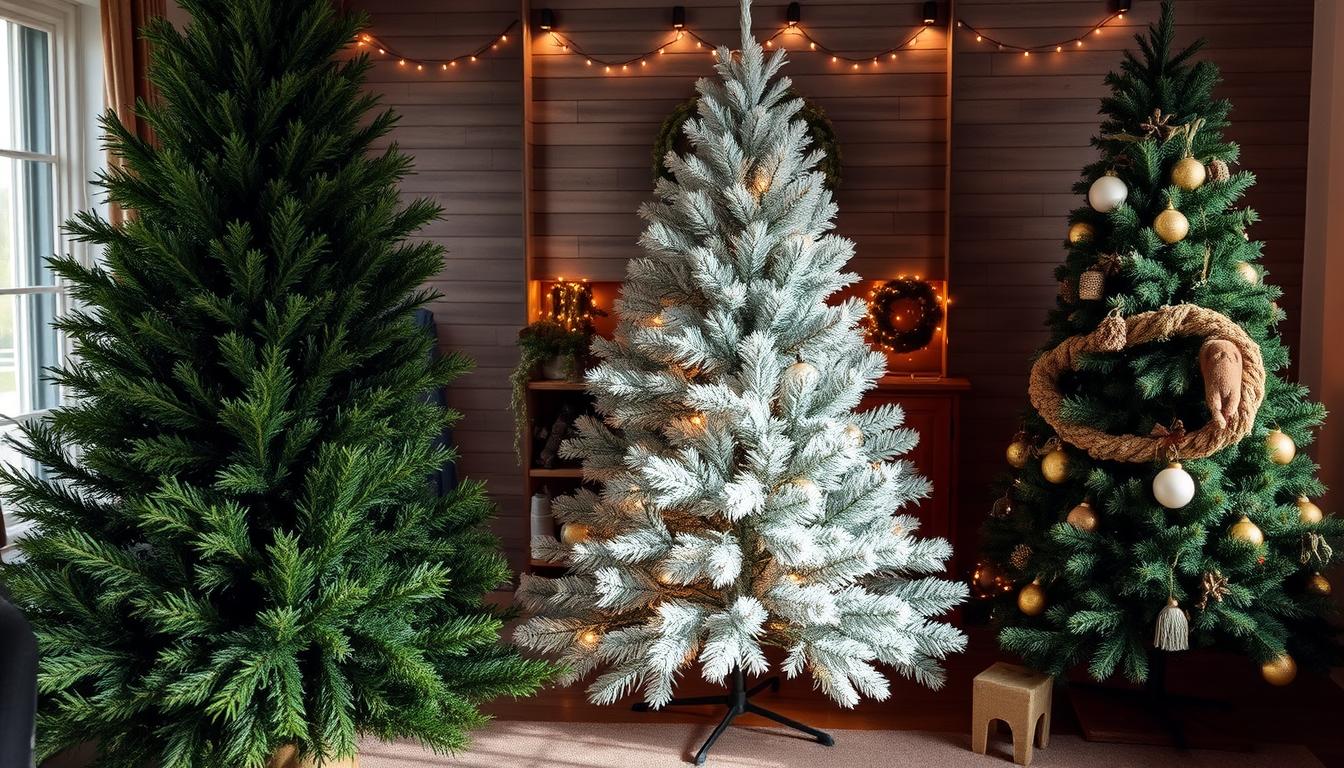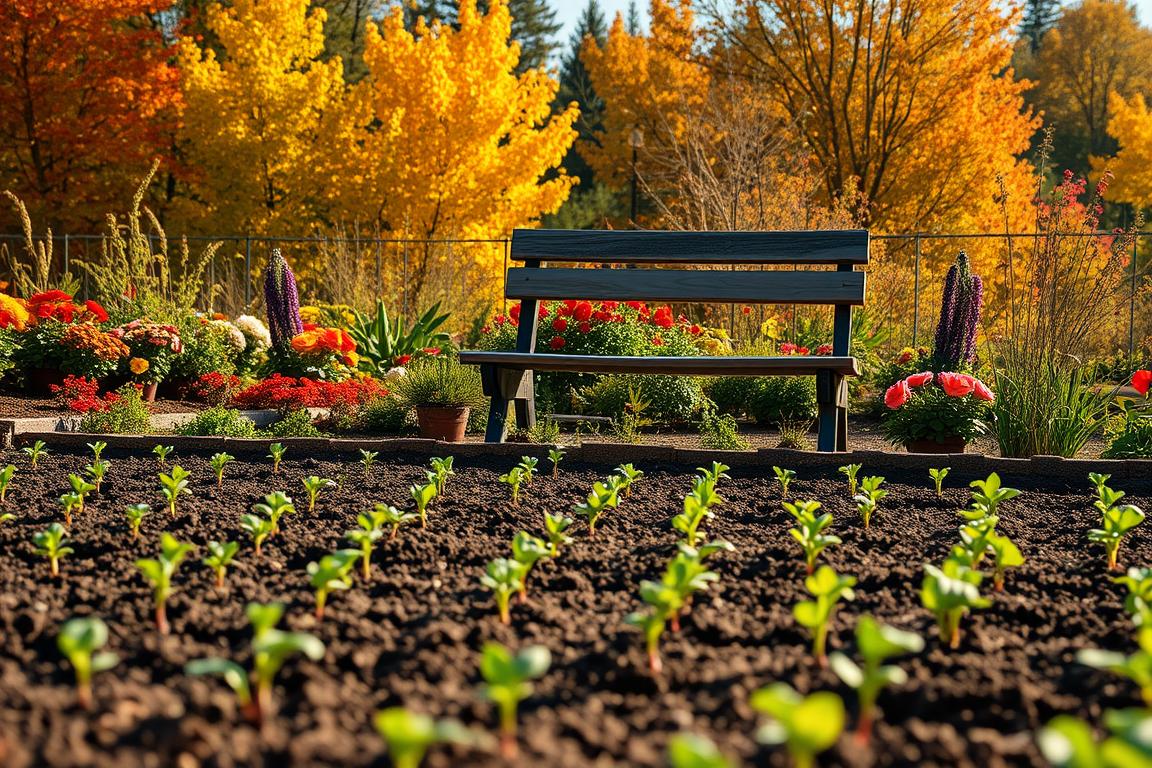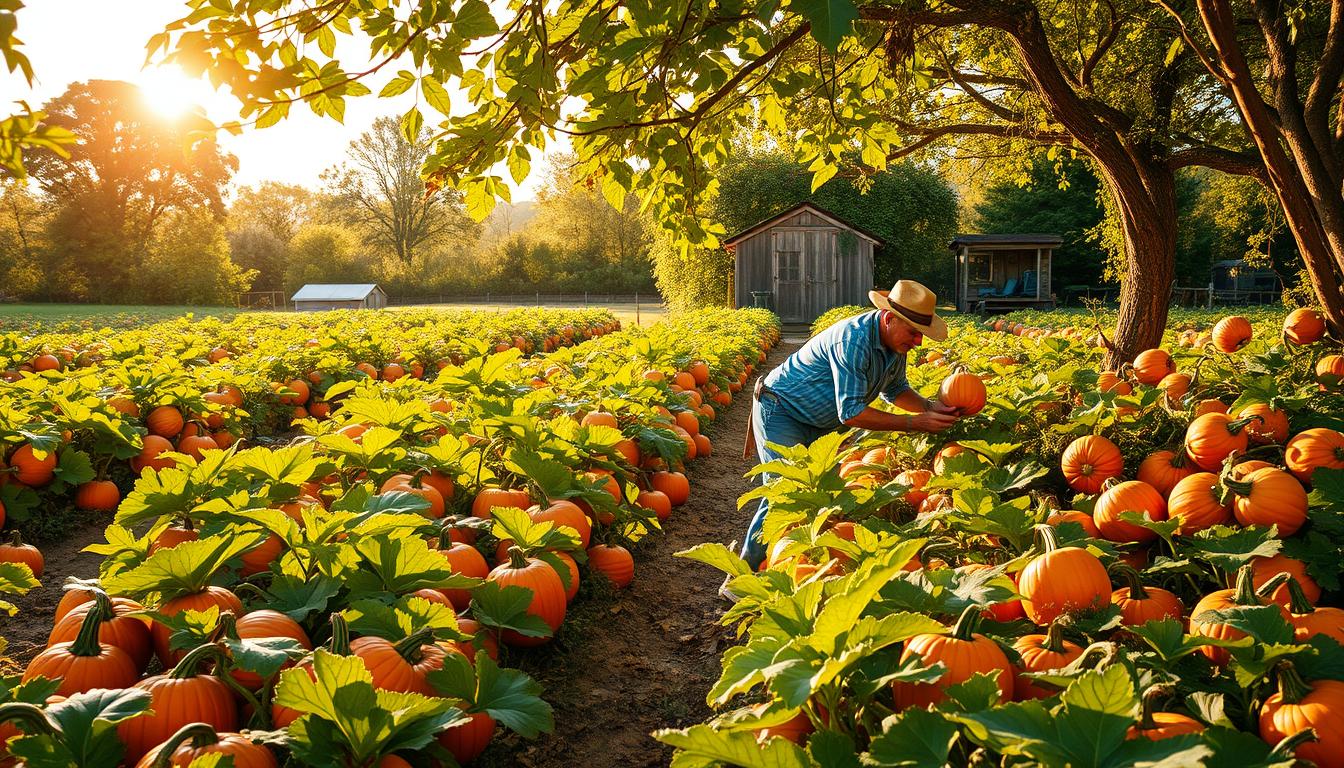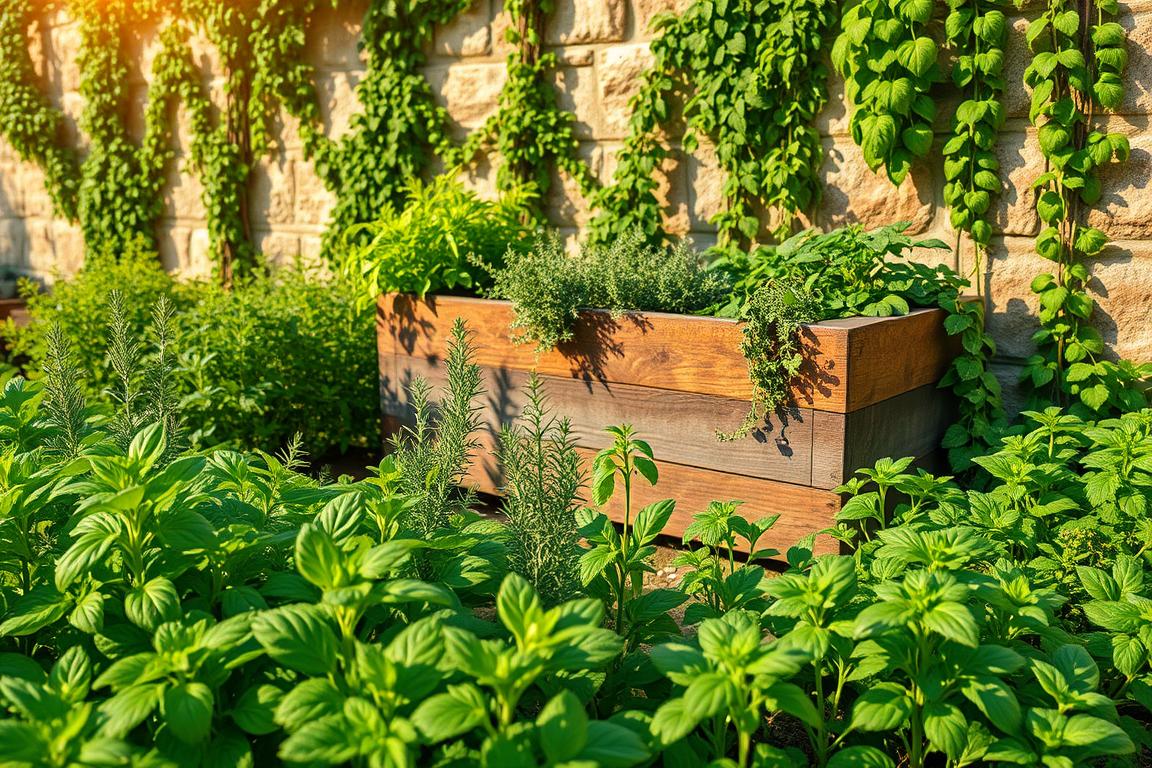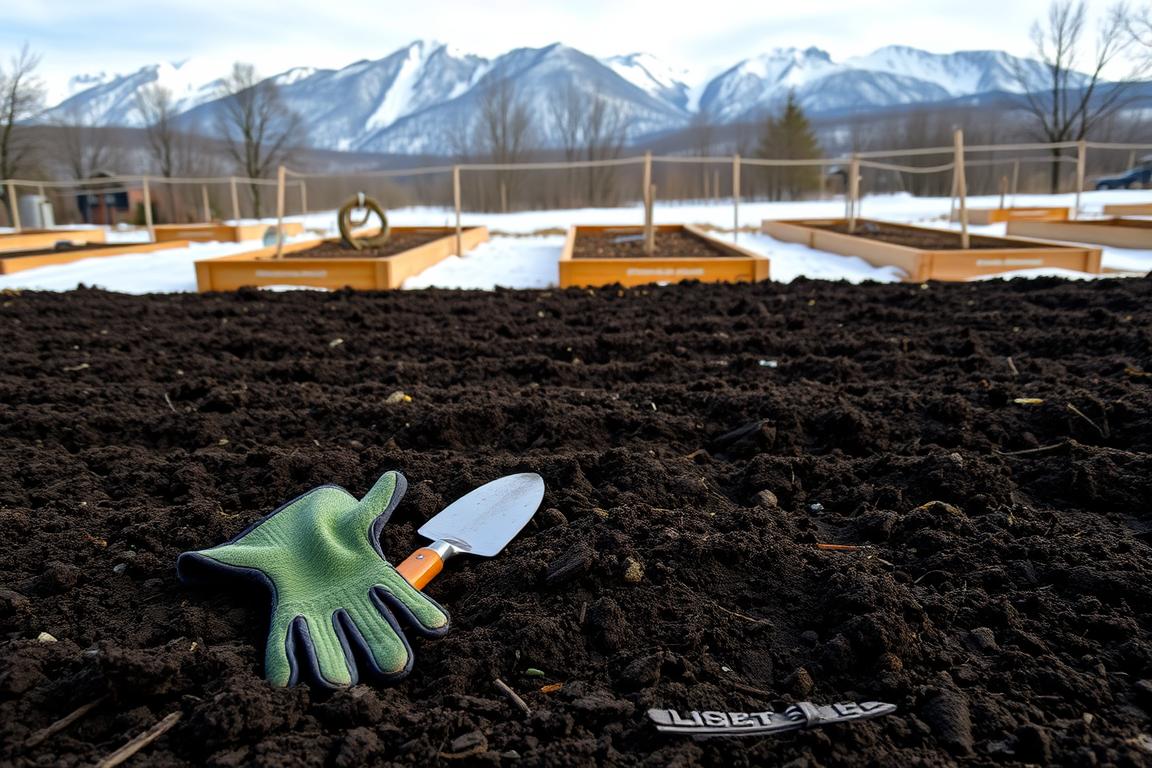As the holiday season gets closer, finding the perfect Christmas tree becomes a top priority. Real Christmas trees come in many species, each with its own special traits. From the strong branches of Douglas firs to the sweet scent of balsam firs, there’s a tree for every home and taste.
Whether you want a classic Scotch pine or a lively Colorado blue spruce, there are many choices. The type of Christmas tree you pick can really set the mood for the holidays. It’s a big decision for those who love decorating and making their homes festive.
Key Takeaways
- Real Christmas trees come in a variety of species, including firs, spruces, and pines.
- Each tree type has unique characteristics, such as needle retention, fragrance, branch strength, and color.
- Factors like home space, allergies, and personal preferences should be considered when choosing a Christmas tree.
- Popular choices include Douglas fir, white pine, grand fir, Colorado blue spruce, and Scotch pine.
- Freshly cut trees offer the best holiday experience, but artificial trees can also be a practical option.
Understanding Christmas Tree Varieties
Choosing the right Christmas tree is important. Knowing the differences between firs, spruces, and pines is key. Each tree family has its own look and feel.
Differences Between Firs, Spruces, and Pines
Fir trees have flat needles that grow in a spiral pattern. This makes them look lush and full. Spruces have a pyramidal shape and four-sided needles. Their cones hang down.
Pines have clusters of needles, making them look denser. They have fewer branches but still look great.
Key Characteristics of Each Tree Family
- Firs are found in many places like Central and North America, Europe, Asia, and North Africa. They offer many options for Christmas trees.
- Spruces grow well in mountainous areas of Western and Northern America. They are strong and last long.
- Pines are less dense, allowing for big ornaments. They are great for those who like a simple look.
Growth Regions and Natural Habitats
| Tree Family | Growth Regions | Natural Habitats |
|---|---|---|
| Firs | Central and North America, Europe, Asia, North Africa | Mountainous and temperate regions |
| Spruces | Western and Northern America | Mountainous regions |
| Pines | Sparse distribution | Varied, from mountainous to temperate regions |
Knowing about the Christmas tree species helps you choose the best tree for your home.
The Best Types of Christmas Trees for Your Home
Choosing the perfect Christmas tree is exciting. You have many options, from the classic fraser fir to the fragrant balsam fir. Each tree has its own charm and benefits. Let’s look at some popular choices for your home:
- Fraser Fir: The fraser fir is loved for its needles that stay on well and strong branches. It has a deep green color and a symmetrical shape, making it a classic choice.
- Douglas Fir: The douglas fir is a favorite for its fresh scent and soft needles. These are perfect for decorating.
- Balsam Fir: If you want a tree that smells amazing, choose the balsam fir. Its scent is rich and earthy, making it a holiday favorite.
- Noble Fir: The noble fir is known for its classic look. It has dense branches and a tall, stately shape, making it a premium choice.
- Scotch Pine: The scotch pine is easy to care for and lasts long. Its soft branches are great for hanging ornaments.
- White Pine: The white pine has soft needles and a natural look. It’s perfect for those who want a tree that looks like a real forest tree.
Choosing the right Christmas tree is important. Make sure it’s well-watered and cared for. This will help it last longer and bring joy to your holiday season.
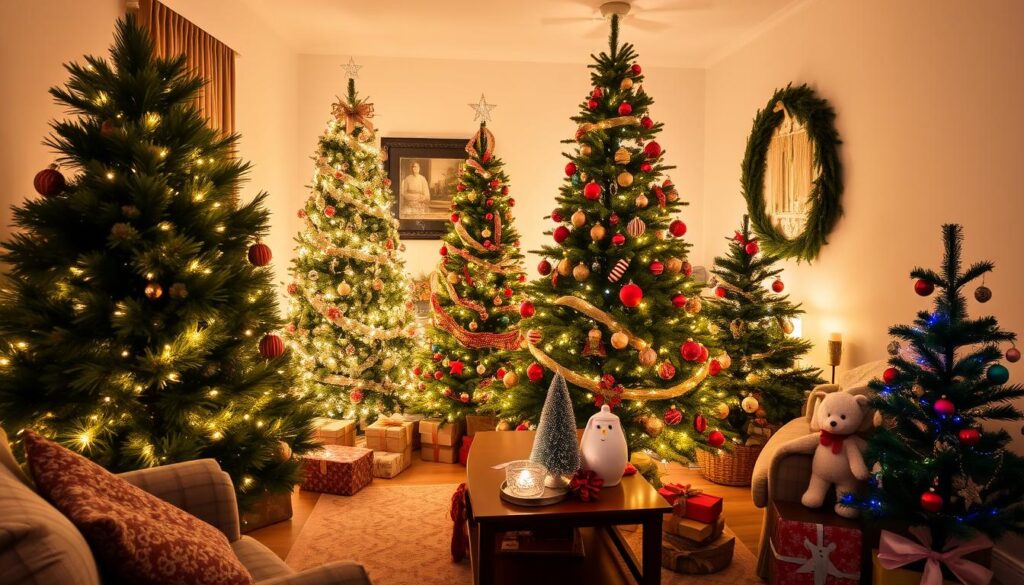
“The smell of a fresh Christmas tree is one of the most iconic and beloved scents of the holiday season.”
Fraser Fir: The Most Popular Choice
The Fraser fir is the top pick for Christmas trees in the U.S. It comes from the southern Appalachian Mountains. This tree is loved for its great looks and lasting freshness.
Notable Characteristics and Benefits
The Fraser fir keeps its needles well, keeping your tree looking fresh for weeks. It can hold heavy tree decorations thanks to its strong branches. This makes it perfect for decorating.
Ideal Home Settings
The Fraser fir’s dark blue-green color and silver-lined needles add beauty to any room. It fits well in small spaces, making it great for any home setting. It’s perfect for both classic and modern Christmas tree looks.
Care Requirements
Keeping your Fraser fir fresh is key. Make sure to water it regularly. With the right care, it will stay vibrant and fragrant all season.
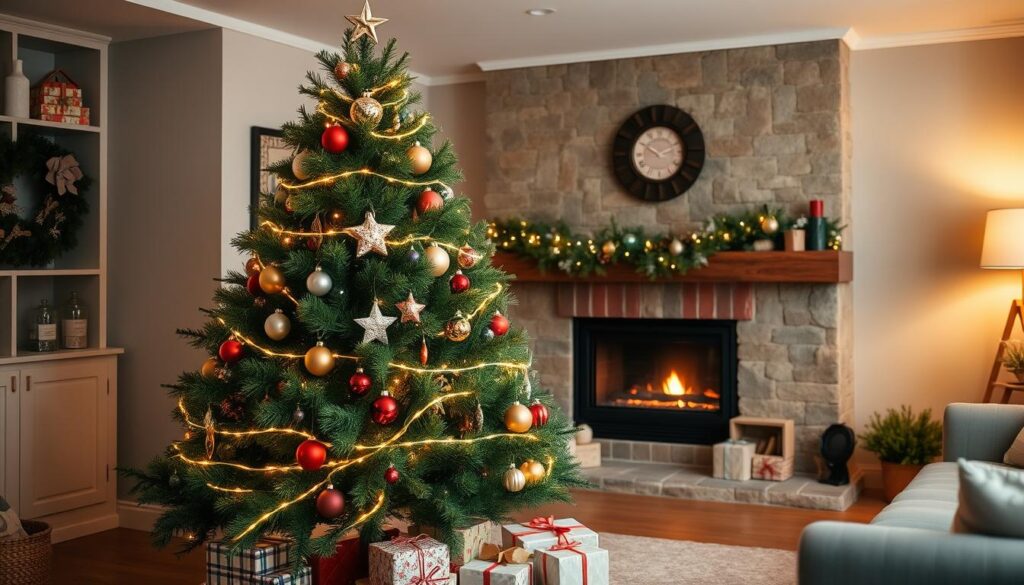
Douglas Fir: Traditional Beauty and Fragrance
The Douglas fir has been a favorite for Christmas trees since the 1920s. It’s loved for its classic look and lovely scent. This tall tree has a full shape and dark green leaves, adding elegance to any holiday spot.
The Douglas fir’s soft, light green needles smell sweet. This scent brings the forest to your home, making it cozy. Even though its branches are not as stiff, they hold up well to ornaments.
Looking for a budget-friendly tree? The Douglas fir is a good choice. It’s popular and easy to find, making it perfect for many families.
Decorating with a Douglas fir can make any room feel warm and welcoming. It’s perfect for creating a holiday atmosphere that feels true to the season.
Balsam Fir: The Most Aromatic Option
The balsam fir is the top choice for a classic Christmas tree. It’s known for its strong, spicy scent. This smell can fill a home for weeks, making it a hit with holiday fans.
Signature Scent Profile
The balsam fir has a clear evergreen smell that lasts long after it’s indoors. Its scent is a mix of citrus and pine. This unique smell makes it a favorite for Christmas trees.
Decorating Potential
The balsam fir is great for decorating too. Its dense, soft leaves and strong branches hold ornaments and lights well. Its classic shape also fits well with traditional Christmas looks.
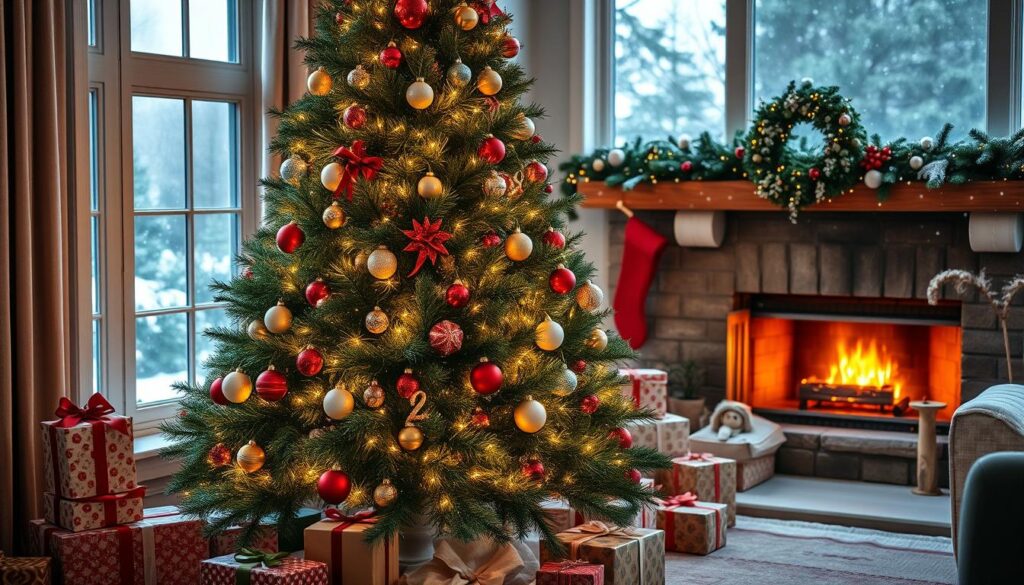
Balsam fir trees come from the Northeast and Appalachian mountains. They add a special touch to holiday celebrations. Their amazing smell and decorating ability make them top picks for balsam fir christmas trees during the holidays.
Noble Fir: Premium Choice for Classic Appeal
The noble fir is a top pick for a classic Christmas tree. It comes from the Pacific Northwest and Northern California. This tree has a beautiful blue-green color and keeps its needles well.
Its branches are perfect for ornaments, making it a hit for decorating. The tree also smells great, adding to the holiday feel. It makes any home feel warm and welcoming.
Choosing a noble fir means you value quality and tradition. It’s great for big holiday displays or cozy family times. It stands out among noble fir christmas trees, premium christmas trees, and classic christmas trees.
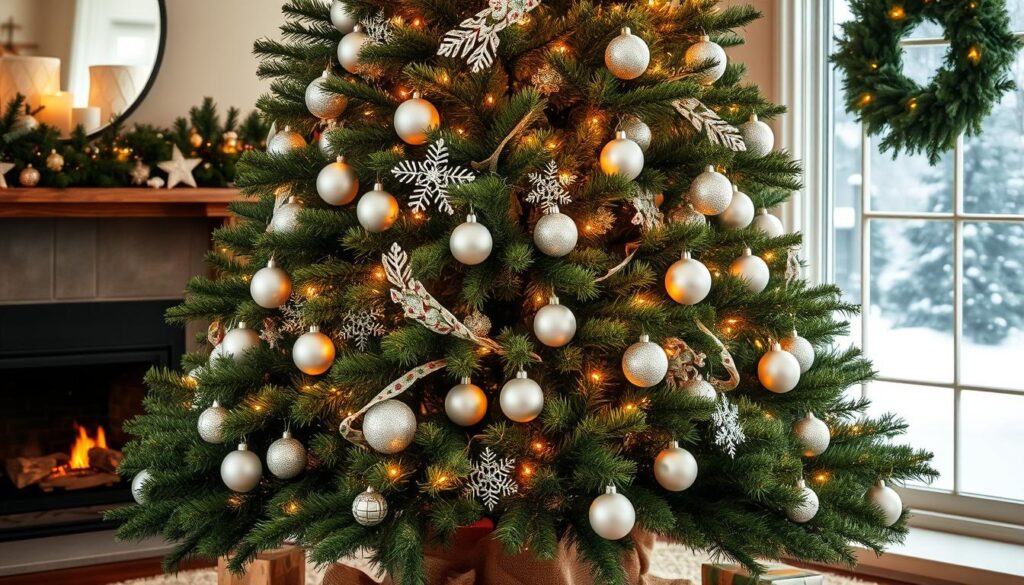
“The noble fir is a timeless classic that embodies the very essence of the holiday season.”
Blue Spruce: Stunning Color and Durability
The blue spruce, also known as the Colorado blue spruce, is a favorite for Christmas trees. It has a unique blue-gray color. Its symmetrical shape and sturdy branches are perfect for hanging ornaments.
Unique Blue-Gray Coloring
The blue spruce stands out with its blue-gray needles. These needles can be soft powder blue or vibrant steel-blue. This color adds elegance and catches the eye in holiday decor.
Ornament Support Capacity
The blue spruce’s branches are strong and can hold many ornaments. This is great for those who want a fully decorated tree without worrying about branches breaking.
This tree is also known for lasting a long time. Its needles stay vibrant and don’t shed much. This makes it a reliable choice for families looking for colorful christmas trees and durable christmas trees.
“The blue spruce is a true standout among Christmas tree options, with its stunning blue-gray hue and sturdy branches that can support all of your favorite ornaments.”
Scotch Pine: Low-Maintenance Excellence
Scotch Pine, also called Scots Pine, is a favorite for many during the holidays. It keeps its needles well, even when it dries out. Its dark green leaves and wide branches make decorating easy.
This pine is considered one of the most beautiful. It’s a top pick for Christmas trees.
Looking for a tree that’s easy to care for? Scotch Pine is perfect. Its strong branches hold lots of lights and ornaments. It grows well in many places, making it a great choice for families everywhere.
Want a scotch pine that lasts long and is easy to care for? Scotch Pine is a great pick. Its classic look and practical benefits make it a holiday favorite.
FAQ
What are the most popular types of Christmas trees?
Popular Christmas trees include Fraser fir, Douglas fir, Balsam fir, Noble fir, Blue spruce, and Scotch pine. Each has its own look, smell, and strength.
What are the differences between firs, spruces, and pines?
Firs have flat needles, spruces have four-sided needles, and pines have clustered needles. Firs grow in North America and Europe. Spruces are found in Western and Northern America. Pines are less common.
Why is the Fraser fir considered the best Christmas tree?
Fraser fir is the top choice for Christmas trees. It keeps its needles well, has strong branches, and smells nice. It’s perfect for homes because it lasts long.
What are the notable characteristics of the Douglas fir?
Douglas fir has a full shape, dark green leaves, and a sweet scent. Its dense look and soft needles need lighter ornaments. It’s a great choice for decorating.
What makes the Balsam fir a unique Christmas tree option?
Balsam fir is known for its strong, spicy smell. It has a classic shape and dark green needles. Its sturdy branches are great for hanging ornaments.
Why is the Noble fir a premium Christmas tree choice?
Noble fir stands out for its blue-green color and dense foliage. It has strong branches and keeps its needles well. Its woodsy scent and symmetrical shape make it a top choice.
What are the unique features of the Blue spruce Christmas tree?
Blue spruce, or Colorado blue spruce, has a unique blue-gray color. It has a symmetrical shape and strong branches for ornaments. Its sharp needles keep pets away, and it stays colorful all season.
Why is the Scotch pine a low-maintenance Christmas tree option?
Scotch pine, or Scots pine, keeps its needles well even when it dries out. It has dark green leaves and wide branches for easy ornament hanging. It’s one of the most beautiful pine trees.


